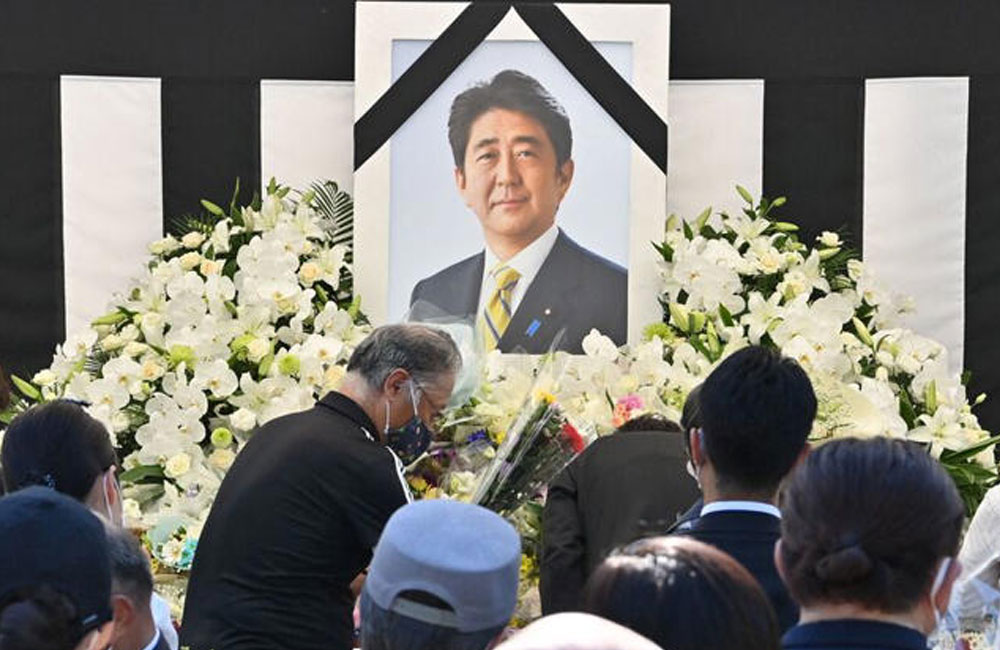World

Heatwave warnings across Australia as millions celebrate national day
Australian authorities have issued heatwave warnings for most of the country as millions celebrate Australia Day.
Temperatures are expected to peak on Tuesday, reaching the “high forties” Celsius in the southern states of Victoria and South Australia, the Bureau of Meteorology said.
On Sunday, South Australia recorded temperatures as high as 48.5C, according to the bureau, which is warning of fire danger in parts of the country.
Some national day celebrations on Monday have been cancelled out of safety concerns.
Australia Day - 26 January - is the anniversary of the 1788 landing of Britain’s First Fleet, which began the era of colonisation.
In Adelaide, an Australia Day parade and light show have been cancelled due to the extreme heat forecast.
“While this is deeply disappointing for the community, performers and partners, community safety and wellbeing must come first,” organisers said.
Aside from Victoria and South Australia, heatwave warnings have also been issued in New South Wales, Queensland, Tasmania, Northern Territory and the Australian Capital Territory.
Many of these warnings will remain in place until Wednesday.
“We haven’t seen heatwave conditions like this in Victoria for almost 20 years,” Tim Wiebusch, Victoria’s emergency management commissioner, told ABC.
“It was 2009 ahead of the bushfires where we saw those prevailing conditions and so we are indicating to all Victorians that this is a very serious set of weather conditions.”
On Monday, the Bureau of Meteorology warned of “extreme fire dangers” across parts of South Australia and much of south-western Victoria “due to very hot and dry weather combined with moderate to gusty winds”.
Firefighters in Victoria are working to combat several fires across the state, which have prompted evacuations and threatened properties.
The heat has also affected the Australian Open at Melbourne Park. Tennis player Jannik Sinner was seen suffering from cramps on the court on Saturday, before play was temporarily suspended in the rising heat. Nearly 80,000 fans were warned to take care under the scorching sun.
Meanwhile, parts of Western Australia were pummelled by Tropical Cyclone Luana over the weekend. The storm damaged homes and a popular beach resort before weakening as it moved inland.
The meteorological bureau has advised people to find places to keep cool, like their homes, libraries, community centres or shopping centres. It also told people to close their windows and draw the curtains to keep heat out of their homes.
Source:

Trump administration sets meetings with oil companies over Venezuela, source says
The administration of President Donald Trump is planning to meet with executives from U.S. oil companies later this week to discuss boosting Venezuelan oil production after U.S. forces ousted its leader Nicolas Maduro, according to a source familiar with the matter.
The meetings are crucial to the administration’s hopes of getting top U.S. oil companies back into the South American nation after its government, nearly two decades ago, took control of U.S.-led energy operations there.
The three biggest U.S. oil companies - Exxon Mobil , ConocoPhillips, and Chevron have not yet had any conversations with the administration about Maduro’s ouster, according to four oil industry executives familiar with the matter, contradicting Trump’s statements over the weekend that he had already held meetings with “all” the U.S. oil companies, both before and since Maduro was seized.
“Nobody in those three companies has had conversations with the White House about operating in Venezuela, pre-removal or post-removal to this point,” one of the sources said on Monday.
The upcoming meetings will be crucial to the administration’s hopes to boost crude oil production and exports from Venezuela, a former OPEC nation which sits atop the world’s largest reserves and whose barrels can be refined by specially designed U.S. refineries. Achieving that goal will require years of work and billions of dollars of investment, analysts say.
It is unclear what executives will be attending the upcoming meetings, and whether oil companies will be attending individually or collectively.
The White House did not comment on the meetings but said it believed the U.S. oil industry was ready to move into Venezuela.
“All of our oil companies are ready and willing to make big investments in Venezuela that will rebuild their oil infrastructure, which was destroyed by the illegitimate Maduro regime,” said White House spokesperson Taylor Rogers.
Exxon, Chevron and ConocoPhillips did not immediately respond to requests for comment.
Trump told NBC News the U.S. may subsidize oil companies to enable them to rebuild Venezuela’s energy infrastructure.
Asked if the administration had briefed any oil companies ahead of the military operation, Trump said, “No. But we’ve been talking to the concept of, ‘what if we did it?’“
“The oil companies were absolutely aware that we were thinking about doing something,” Trump told NBC News. “But we didn’t tell them we were going to do it.”
He told NBC News it was “too soon” to say whether he had personally spoken to top executives at the three companies.
“I speak to everybody,” he said.
CBS News, citing an unnamed source, said executives from the three were expected to meet on Thursday with Energy Secretary Chris Wright.
One oil industry executive told Reuters the companies would be reluctant to talk about potential Venezuela operations in group settings with the White House, citing antitrust concerns that limit collective discussions among competitors about investment plans, timing and production levels.
BIG PLANS, BIG PROBLEMS
U.S. forces on Saturday conducted a lightning raid on Venezuela’s capital, arresting Maduro in the dead of night and sending him to the United States to face narcoterrorism charges.
Trump said hours after Maduro’s capture he expects the biggest U.S. oil companies to spend billions of dollars boosting Venezuela’s oil production, after it dropped to around a third of its peak over the past two decades due to underinvestment and sanctions.
But those plans will be hindered by lack of infrastructure, along with deep uncertainty over the country’s political future, legal framework and long-term U.S. policy, according to industry analysts.
Chevron is the only American major currently operating in Venezuela’s oil fields.
Exxon and ConocoPhillips, meanwhile, had storied histories in the country before their projects were nationalized by former President Hugo Chavez.
“I don’t think you’re going to see any company other than Chevron, who’s already there, you know, commit to developing this resource,” said one oil industry executive, who asked not to be named discussing the issue.
Conoco has been seeking billions of dollars in restitution for the takeover of three oil projects in Venezuela under Chavez. Exxon was involved in lengthy arbitration cases against Venezuela after it exited the country in 2007.
Chevron, which exports around 150,000 barrels per day of crude from Venezuela to the U.S. Gulf Coast, meanwhile, has had to carefully maneuver with the Trump administration in an effort to maintain its presence in the country in recent years.
Investors were optimistic, betting Washington’s move against Venezuela’s leadership would allow U.S. firms access to the oil reserves. A U.S. embargo on Venezuelan oil remained in full effect, Trump said.
The S&P 500 energy index rose to its highest since March 2025, with heavyweights Exxon Mobil rising 2.2% and Chevron jumping 5.1%.
(Source: adaderana.lk)

India’s military might on full display at 77th Republic Day celebrations
India ushered in its 77th Republic Day on Monday (January 26, 2026) with a grand display of its military prowess that included missiles, warplanes, newly-raised units and lethal weapon systems used during Operation Sindoor.
President of the European Council, Antonio Costa, and President of the European Commission, Ursula von der Leyen, graced the celebrations as chief guests.
The overarching theme of the event at the Kartavya Path, the centrepiece boulevard of the national capital, was 150 years of ‘Vande Mataram’.
The parade commenced with the President Droupadi Murmu taking the salute shortly after she, Mr. Costa and Ms. von der Leyen, flanked by the Indian President’s bodyguards, arrived at the Kartavya Path in a traditional buggy.
Prime Minister Narendra Modi, Defence Minister Rajnath Singh, several other Union ministers, the country’s top military brass, foreign diplomats, and senior officials were among the spectators.
The major weapon systems displayed included BrahMos and Akash weapon systems, rocket launcher ‘Suryastra’, Main Battle Tank Arjun and an array of indigenously-built military platforms and hardware.
Around 100 artistes heralded the parade on the theme ‘Vividata Mein Ekta (Unity in Diversity) that featured a grand presentation of musical instruments, demonstrating the nation’s unity and rich cultural diversity.
Source: adaderana.lk

US Dollar Holds Steady Against Rupee as Bank Rates Show Minor Changes
The Sri Lankan Rupee showed little movement against the US Dollar at local commercial banks today , maintaining levels similar to those recorded at the end of last week. In several banks, the selling rate continued to remain close to Rs. 312.At Seylan Bank, the dollar buying rate edged up slightly to Rs. 307.05, while the selling rate stood at Rs. 311.80. NDB Bank reported a marginal increase in its buying rate from Rs. 306.25 to Rs. 306.55, with the selling rate also rising from Rs. 312.75 to Rs. 313.05.
People’s Bank indicated a small uptick in the buying rate, moving from Rs. 306.04 to Rs. 306.23, while the selling rate increased from Rs. 312.79 to Rs. 312.99. Meanwhile, Commercial Bank maintained its previous rates, with the buying price fixed at Rs. 304.49 and the selling price unchanged at Rs. 313.
Sampath Bank also recorded a slight increase, with the buying rate rising from Rs. 305.75 to Rs. 306.75 and the selling rate climbing from Rs. 312.25 to Rs. 313.25. Overall, currency markets reflected stability, with only marginal adjustments across banks.

Trump at WEF 2026: “When America booms, the entire world booms.”
donald Trump arrived at the World Economic Forum this year not as a cautious participant in global dialogue, but as a man delivering a victory lap.
Marking one year since his return to the White House, the U.S. President used the Davos podium to proclaim what he called the “fastest and most dramatic economic turnaround in American history,” casting the United States as the undisputed engine of global growth and warning allies that the era of one-sided dependence on Washington is over.
“Growth is exploding. Productivity is surging. Investment is soaring. Incomes are rising. Inflation has been defeated,” Trump told the packed hall. “We were a dead country. Now we are the hottest country anywhere in the world.”
An Economic Boast, Delivered Without Apology
Trump’s core message was unmistakable: his economic model works, and the world should pay attention.
He pointed to 5.4 per cent projected fourth-quarter growth, core inflation at 1.6 per cent, and 52 stock market record highs since his election victory. According to Trump, those gains added $9 trillion in household wealth, while 1.2 million Americans moved off food assistance.
“Virtually no inflation and extraordinarily high economic growth,” he said. “Growth like our country has never seen before.”
The President repeatedly contrasted his record with that of the Biden administration, which he blamed for “stagflation, open borders and economic decline,” framing his return as a national rescue mission completed in record time.
Deregulation, Tariffs and a Smaller Government
At the heart of Trump’s argument was a rejection of what he called Western economic orthodoxy large government, green energy mandates and mass migration.
He highlighted the removal of 270,000 federal bureaucrats, a 27 per cent reduction in the budget deficit, and a regulatory rollback that he claimed eliminated 129 old rules for every new one introduced.
“Instead of empowering bureaucrats, we’re firing them,” Trump said. “They hated me at first. Now they love me they’re making more money in the private sector.”
Tariffs, often criticised by economists, were recast as a strategic weapon that Trump said cut the U.S. trade deficit by 77 per cent in one year, boosted steel production and triggered a surge in factory construction.
“Everyone said tariffs would cause inflation,” he told the audience. “We proved them wrong.”
Energy Nationalism and the Rejection of Green Orthodoxy
One of the speech’s sharpest departures from Davos consensus came on energy. Trump dismissed renewable-focused policies as economically destructive, arguing they hollowed out Western industry while enriching rivals.
“Instead of building ineffective, money-losing windmills, we’re opening power plants,” he said.
He cited record oil and gas output, falling fuel prices and a renewed embrace of nuclear energy as proof that cheap, reliable power not climate idealism drives prosperity.
“You’re supposed to make money with energy,” Trump said. “Not lose money.”
A Warning to Europe
While declaring affection for Europe, Trump issued an unmistakable warning: the continent is weakening itself through energy restrictions, high costs and what he called socially destabilising migration.
“Friends come back and say, ‘I don’t recognise it anymore,’” he said. “And not in a good way.”
He urged European leaders to prioritise growth, security and self-reliance, arguing that America could not indefinitely shoulder the burden of Western stability.
Greenland, NATO and American Power
The most controversial section of Trump’s address centred on Greenland, which he declared a “core national security interest” of the United States.
“No nation or group of nations is in any position to secure Greenland other than the United States,” he said, calling for immediate negotiations with Denmark over acquisition.
Trump framed the proposal as a defensive necessity, not expansionism, insisting it would strengthen NATO rather than weaken it.
“We want strong allies,” he said. “Not seriously weakened ones.”
Peace Through Strength
On global security, Trump presented himself as both a deal-maker and a deterrent, claiming progress in ending multiple international conflicts while rebuilding American military dominance.
“I don’t want to use force,” he said. “I don’t have to.”
His message to allies was blunt: American protection comes with expectations and patience is not unlimited.
A Speech That Redefined the Room
Trump’s Davos address was not an attempt to blend in. It was a challenge to economists, environmentalists, allies and adversaries alike.
In a forum built on consensus, Trump delivered confrontation. In a space devoted to multilateralism, he argued for national power first.
Whether embraced or resisted, his message was clear:
“When America booms, the entire world booms.”
(Source:lankanews.lk)

Trump warns Iran of possible strike, urges Hamas to disarm after meeting Netanyahu
U.S. President Donald Trump said on Monday the United States could support another major strike on Iran were it to resume rebuilding its ballistic missile or nuclear weapons programs and warned Hamas of severe consequences if it does not disarm.
Speaking beside Israeli Prime Minister Benjamin Netanyahu following a meeting at his Mar-a-Lago estate in Florida, Trump suggested Tehran may be working to restore its weapons programs after a massive U.S. strike in June.
"I've been reading that they're building up weapons and other things, and if they are, they're not using the sites we obliterated, but possibly different sites," Trump told reporters during a press conference.
"We know exactly where they're going, what they're doing, and I hope they're not doing it because we don't want to waste fuel on a B-2,” he added, referring to the bomber used in the earlier strike. "It's a 37-hour trip both ways. I don't want to waste a lot of fuel."
Trump, who has broached a potential nuclear deal with Tehran in recent months, said his talks with Netanyahu focused on advancing the fragile Gaza peace deal he brokered and addressing Israeli concerns over Iran and over Hezbollah in Lebanon.
Iran, which fought a 12-day war with Israel in June, said last week that it had conducted missile exercises for the second time this month.
Netanyahu said last week that Israel was not seeking a confrontation with Iran, but was aware of the reports, and said he would raise Tehran's activities with Trump.
A SECOND PHASE IN GAZA?
Trump said he wanted to move to the second phase of the ceasefire deal between Israel and the Palestinian militant group Hamas reached in October after two years of fighting in Gaza, a progression that entails international peacekeeping forces deployed in the Palestinian enclave.
Israel and Hamas accuse each other of major breaches of the deal and look no closer to accepting the much more difficult steps envisaged for the next phase. Hamas, which has refused to disarm, has been reasserting its control as Israeli troops remain entrenched in about half the territory.
Israel has indicated that if Hamas is not disarmed peacefully, it will resume military action to make it do so. During his Monday comments, Trump heaped the blame on the militant group for not disarming more promptly, arguing that Israel had lived up to its side of the deal and warning that Hamas was inviting grave consequences. "There will be hell to pay," Trump warned when asked what he will do if Hamas does not lay down its arms. He has made similar statements at previous intervals during the fighting.
Netanyahu said this month that Trump had invited him for the talks, as Washington pushes to establish transitional governance for the Palestinian enclave amid Israeli reluctance to move forward.
The deployment of the international security force was mandated by a November 17 U.N. Security Council resolution.
While Washington has brokered three ceasefires involving its longtime ally - between Israel and Hamas, Israel and Iran, and Israel and Lebanon - Netanyahu is wary of Israel's foes rebuilding their forces after they were considerably weakened in multiple wars.
Overall, Trump's comments suggested he remains firmly in Netanyahu's camp, even as some aides have privately questioned the Israeli leader's commitment to the Gaza ceasefire. His comments also suggested he is willing to risk additional hostilities related to Gaza and Iran, even as Trump has taken credit for resolving Israel's wars in both places.
Trump struck a warm tone as he greeted Netanyahu before their meeting, going so far as to say that Israeli President Isaac Herzog had told him he planned to pardon Netanyahu of corruption-related charges - a conversation Herzog's office immediately denied took place.
Netanyahu reciprocated, telling reporters after the meeting that he was gifting Trump the country's Israel Prize, which he said has historically been reserved for Israelis.
NEXT STEPS IN GAZA CEASEFIRE PLAN
Trump's plan to end the Gaza war ultimately calls for Israel to withdraw from the Palestinian territory and Hamas to give up its weapons and forgo a governing role.
The first phase of the ceasefire included a partial Israeli withdrawal, an increase in aid and the exchange of hostages for Palestinian detainees and prisoners.
An Israeli official in Netanyahu's circle said that the prime minister would demand that the first phase of the ceasefire be completed by Hamas returning the remains of the last Israeli hostage left in Gaza, before moving ahead to the next stages. The family of the deceased hostage, Ran Gvili, joined the prime minister's visiting entourage.
Israel has yet to open the Rafah crossing between Gaza and Egypt, also a condition of Trump's plan, saying it will only do so once Gvili's remains are returned.
Trump said that he and Netanyahu did not agree fully on the issue of the Israeli-occupied West Bank but the Republican leader did not lay out what the disagreement was.
TURKEY, SYRIA ALSO DISCUSSED
Before the meeting, Trump told reporters he would talk to Netanyahu about the possibility of stationing Turkish peacekeepers in Gaza. That is a fraught subject - while Trump has frequently praised Turkish President Tayyip Erdogan, Israel and Turkey have a much more circumspect relationship.
While the fighting in Gaza has abated, it has not stopped entirely. Although the ceasefire officially began in October, Israeli strikes have killed more than 400 Palestinians — most of them civilians, according to Gaza health officials — and Palestinian militants have killed three Israeli soldiers.
Netanyahu said on Monday that Israel was keen to ensure a peaceful border with Syria, and Trump said he was sure Israel would get along with President Ahmed al-Sharaa, who took power after longtime strongman Bashar al-Assad was deposed last year.
But Israel has been suspicious of the new leader, who was once a member of al-Qaeda, going so far as to bomb government buildings in Damascus this July.

(Source - Reuters)

Japan Hands Life Sentence to Man Who Killed Former PM Shinzo Abe
A Japanese court is set to deliver its verdict this week in a case that has continued to reverberate far beyond the killing itself, exposing long-standing political and religious entanglements in Japan.
The defendant, 45-year-old Tetsuya Yamagami, has admitted to assassinating former Prime Minister Shinzo Abe in July 2022. Abe, one of the most powerful and enduring figures in modern Japanese politics, was no longer prime minister at the time but remained an influential lawmaker. He was attacked while campaigning in the city of Nara, an event that stunned a country known for some of the world’s strictest gun laws.
Yamagami’s trial began in October, and Wednesday’s sentencing will decide whether he spends the rest of his life in prison. Prosecutors are seeking life imprisonment, while the defense has argued for a sentence of no more than 20 years, citing the deep personal and financial hardship Yamagami says he experienced growing up as the child of a follower of the Unification Church.
According to his testimony, Yamagami did not act out of personal hatred toward Abe alone. He said his real target was the Unification Church, a South Korea-based religious group he blamed for his family’s suffering. Abe, he claimed, became a symbolic stand-in after the former leader appeared in a video message supporting an organization linked to the church. Yamagami said killing Abe was meant to draw attention to what he saw as the church’s political influence.
That goal, grim as it was, succeeded in sparking a national reckoning. In the months after the killing, revelations of close ties between the ruling Liberal Democratic Party and the church led the party to publicly distance itself. Government investigations followed, culminating in Japan’s decision to strip the church’s local branch of its tax-exempt status and order its dissolution.
The case has also driven policy changes. It intensified scrutiny of aggressive fundraising practices by religious groups and helped push through new laws aimed at protecting families and children from coercive donation demands. At the same time, security around politicians and public figures has been tightened nationwide.
Public reaction to Yamagami himself has been unusually divided. While many condemn the act as an unforgivable crime, thousands have signed petitions calling for leniency, and supporters have sent letters and care packages to his family and detention facility, framing him as a product of systemic failures rather than a lone villain.
More than two years after Abe’s death, the court’s ruling will close the legal chapter of the case. But its political, social, and cultural aftershocks are likely to shape Japan’s public life for years to come.
(Source - France 24)

Fire at Indonesian Elderly Home Claims 16 Lives
A tragic fire has claimed the lives of 16 people at a nursing home on the Indonesian island of Sulawesi, according to international media reports.
Around 12 others were injured in the blaze and have been admitted to hospital for treatment.
The fire reportedly broke out at approximately 8:31 p.m. last night (28), at a time when many of the elderly residents were resting inside their rooms. Several of the victims were later found lifeless in their own quarters, highlighting the sudden and devastating nature of the incident.
Indonesia, an archipelagic nation made up of more than 17,000 islands, has witnessed frequent deadly fire incidents, often linked to dense urban settings and limited emergency access.
Earlier this month, another major fire in the capital Jakarta engulfed a seven-storey office building, killing at least 22 people — underscoring the recurring danger posed by such disasters.

S Korea’s ex-president Yoon to be jailed for five years over martial law bid
South Korea’s impeached president Yoon Suk Yeol will be jailed for five years over abuse of power, obstructing justice and falsifying documents in relation to his failed martial law bid in 2024.
This is the first of the verdicts in four trials linked to his shock martial law decree. Although short-lived, the move triggered nationwide turmoil, sparking protests as MPs rushed to the national assembly to overturn Yoon’s decision.
Yoon’s actions “plunged the country into political crisis”, a judge said on Friday, noting that Yoon had “consistently shown no remorse”.
Friday’s ruling offers clues as to how the rest of Yoon’s trials could go. His string of charges range from abuse of power to campaign law violations.
The most serious charge is insurrection, for which prosecutors have demanded the death penalty. The verdict in that trial is expected in February.
About 100 supporters of Yoon had gathered outside the courthouse on Friday to watch the livestreamed proceedings projected on a large screen.
Some of them held red banners that read: “Yoon, again! Make Korea great again”. Several could be heard yelling at the judge as he delivered the guilty verdicts, while others looked solemn.
On Friday, Yoon was convicted of using presidential bodyguards to prevent his arrest; failing to consult his entire cabinet before declaring martial law; as well as drafting and then destroying a falsified document claiming the martial law bid had been endorsed by the prime minister and defence minister.
“The accused has the duty to safeguard the constitution and law but turned his back on them,” the judge said.
Prosecutors had sought a 10-year jail term for the charges in Friday’s ruling. Both sides have seven days to appeal.
Yoon denied the charges, arguing that the arrest warrant itself was invalid and that the letter of the law does not require him to consult every member of the cabinet before exercising emergency power.
He had claimed across his trials that investigators had no legal basis to probe and arrest him in the first place. Most of the accusations against him are invalid because there was no procedural lapse when he declared martial law, he argues.
South Korea’s courts often grant leniency when the accused accepts guilt or responsibility. But prosecutors argue that Yoon’s lack of remorse is grounds for an even more severe penalty.
Park Geun-hye, who was sentenced to 20 years in prison for abuse of power and bribery in 2021, was the last former president to be jailed for a criminal charge. But she was pardoned and released from prison shortly after.
Six months after Yoon’s martial law attempt, voters elected opposition leader Lee Jae Myung in a decisive victory.
But Yoon’s trials bring the spotlight back to deep divisions in South Korea, where the former president retains strong supporters who see him as a martyr. According to a survey conducted last December, nearly 30% of South Koreans did not believe that Yoon’s martial law declaration amounted to an insurrection.
While his martial law attempt brought tens of thousands of protesters onto the streets, it also saw his supporters show up in counter protests, though in smaller numbers.
(Source - BBC)

Libyan Army Chief Killed in Plane Crash
Libyan Army Chief Mohammed Ali Ahmed Al-Haddad has been killed in a tragic plane crash near Ankara, Turkey, according to official reports.
The military commander was travelling aboard a private jet carrying four senior army officers and three staff members when the aircraft went down. The jet had departed from Ankara and was en route to Tripoli, Libya, at the time of the accident.
All eight people on board were killed in the crash.
Moments before the incident, the pilots reportedly alerted air traffic control to a technical malfunction and attempted to dump fuel in preparation for an emergency landing. However, the aircraft crashed before it could land.
Investigations into the cause of the crash are currently underway.
General Al-Haddad had travelled to Turkey to take part in high-level discussions aimed at strengthening defence and security cooperation between the two countries.
In response to his death, the Libyan government has declared three days of national mourning, describing the loss of the army chief as a major blow to the nation.

Musk’s X to open source new algorithm in seven days
Elon Musk said on Saturday that social media platform X will open to the public its new algorithm, including all code for organic and advertising post recommendations, in seven days.
“This will be repeated every 4 weeks, with comprehensive developer notes, to help you understand what changed,” he said in his X post.
Earlier this week, the European Commission decided to extend a retention order sent to X last year, which related to algorithms and dissemination of illegal content, prolonging it to the end of 2026, spokesperson Thomas Regnier told reporters on Thursday.
In July 2025, Paris prosecutors investigated the social media platform for suspected algorithmic bias and fraudulent data extraction, which Musk’s X called a “politically-motivated criminal investigation” that threatens its users’ free speech.
Last month, the European Union levied a 120 million euro ($140 million) fine on X, with regulators saying the company breached its transparency obligations under the bloc’s Digital Services Act.
The fine is related to X’s “blue checkmark” subscription, lack of transparency related to its ad repository and failure to provide researchers access to the platform’s public data.
Musk replied with an obscenity under a European Commission post about the fine.
( Source - Reuters )

Japan prepares to restart world's biggest nuclear plant, 15 years after Fukushima
RELUCTANT RESIDENTS WARY OF RESTART
STRENGTHENING ENERGY SECURITY
Page 2 of 51